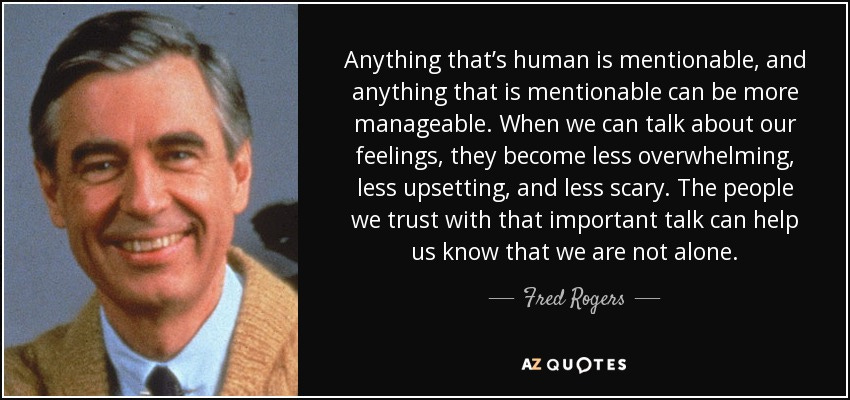You have heard it was said to those of ancient times, ‘You shall not murder…’
But I say to you that if you are angry with a brother or sister, you will be liable to judgment…
Matthew 5:21-22
Mr. Rogers was so good at talking about difficult subjects in ordinary, comfortable ways. He addressed issues of race and segregation. He helped families going through divorce. And, in the above video, he sings about anger.
I’m angry, I’m angry,
Do you ever feel like that?
To be sure, anger is not a feel-good emotion. It is not easy to talk about without, well, getting angry. It is a deeply visceral feeling that causes our heart to beat faster, our face to redden, and fists to clench. Anger is a bodily passion, emotion. One that even God experiences.
The Bible Project is a wonderful resource that, if it is new to you, I encourage you to check out. They have wonderful videos that give faithful teaching on books of the Bible and Christian convictions. In this article, they do a deep dive into scriptures that recount times when God was angry and what it was that made God so angry.
And to be sure, though God is compassionate, abounding in love, and slow to get angry, God does get mad.
Perhaps there is a holiness to our anger as people who have been made in the image of this God who also experience this powerful emotion.
But if God gets angry, then why does Jesus say, “If you are angry with a brother or sister, you will be liable to judgment…?” I thought Jesus was God-the-Son, the Second Person of the Trinity, fully God and fully human. Aren’t these words, quite literally, self-contradictory?
To answer those questions, we have to go back to the passage’s context. The immediate context. The context of the Book of Matthew. And the context of the wider scriptural canon.
So let’s jump in.
Most immediately, Jesus is teaching about His Kingdom, putting it in contrast with others’ interpretations of the scriptures and the other kingdoms of the world. “You have heard it said…but I tell you…” In so doing, Jesus is showing people the heart of the Torah, the desired end or telos to which it is pointing. So, quite straightforwardly, the Great Commandments forbid murder, but the Kingdom of God is defined primarily not by what is avoids (fighting or killing each other) but what it is for, namely being reconciled, in relationship, with one another (5:24).
Essentially, Jesus is pointing us to the heart of the 10 Commandments. God tells us not to murder because God so profoundly values life. God is the Great Giver of Life Abundant, not one of the Greek Fates who cuts and takes away threads of life.
Are you still with me?
Extending our gaze a little wider, Matthew was written to a Jewish-Christian community who was trying to faithfully live as Jesus-followers in very challenging times. Other religious folk were condemning them and their Rabbi’s interpretation of the scriptures. The government was persecuting them. Not in a “they are taking Christmas away from us!” but in a real way, like killing them. You know, real persecution.
Jesus’ words are shaping them to live differently from the tit-for-tat, eye-for-an-eye, even-steven world around them. Jesus’ words are pointing them to a different kind of Kingdom.
It is one thing to get angry - after all, we are humans created in the image of a God who gets angry from time to time. But what we do with that anger defines what kind K/kingdom we are about. Does our anger direct us toward constructive paths of healing, reconciliation, and shalom for the world? Or does it lead us down destructive paths of violence. Anger, in this way, inevitably leads to the way of Death.
The God of the Bible got angry. And rightfully so. The wider scriptural canon gives witness to the times when God got mad. God gets angry at injustice (Isaiah 59:15). God gets angry when the powerful take advantage of the powerless (John 2; Mark 3). God gets angry when people turn away toward other gods (1 Kings 11; 2 Kings 17).
The difference between God’s anger and most of ours, however, is that God’s anger produces righteousness not brokenness (James 1:20).
So let me land this plane, because I need to get to work on my sermon for Sunday and a funeral tomorrow!
If you are feeling Big Anger right now. I’m talking about being angry over injustices that are actively being poured out in the world, our country, and what is happening in states like mine. For harm that is being caused to the most vulnerable. For racist laws and treatment against non-white bodies. For agendas that prioritize the wealthy at the expense of the poor. BIG Anger. Then I present you with the Bible’s challenge: to direct your anger away from paths of further harm and, instead, toward ways of righteousness.
In your anger do not sin...do not make room for the devil (Ephesians 4:26, 27). Do not allow the sins of others cause you to sin as well.
Do not be anxious, but make your anger known to God in prayer (~Philippians 4:6). Take your anger to Jesus and see where His Holy Spirit will guide you next.
And it may very well be time to take Jesus’ words more seriously: “Behold, I send you forth as sheep in the midst of wolves. Be ye therefore wise as serpents and harmless as doves.” There are many wolves in our world, many of whom are guising themselves as sheep and misleading many. In response, Jesus doesn’t tell His followers to be nice; He tells them to be as shrewd as serpents and harmless as doves. Nonviolent. Bent toward righteousness and reconciliation. Angry, yes! But a kind different from the world around us. That’s our challenge.
Lord, help us.





